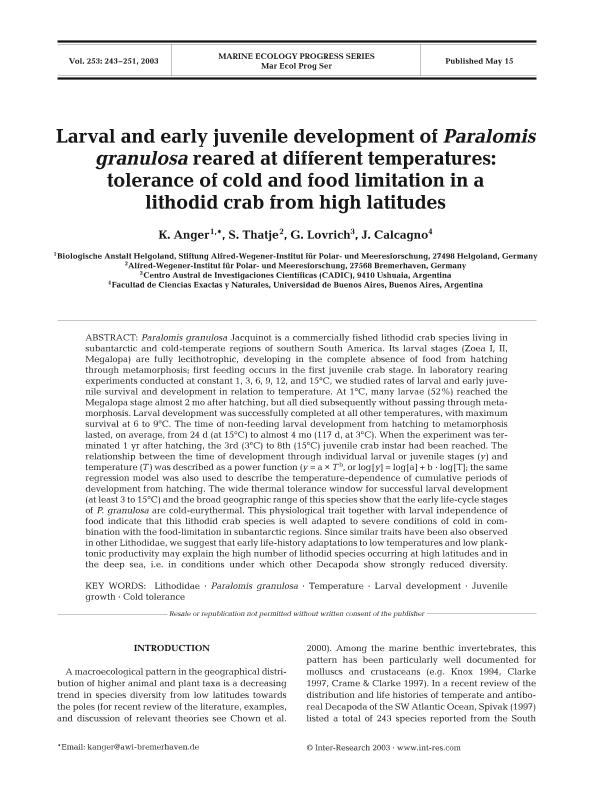Mostrar el registro sencillo del ítem
dc.contributor.author
Anger, K.
dc.contributor.author
Thatje, S.
dc.contributor.author
Lovrich, Gustavo Alejandro

dc.contributor.author
Calcagno, J.
dc.date.available
2020-01-16T18:51:53Z
dc.date.issued
2003-05
dc.identifier.citation
Anger, K.; Thatje, S.; Lovrich, Gustavo Alejandro; Calcagno, J.; Larval and early juvenile development of Paralomis granulosa reared at different temperatures: Tolerance of cold and food limitation in a lithodid crab from high latitudes; Inter-Research; Marine Ecology Progress Series; 253; 5-2003; 243-251
dc.identifier.issn
0171-8630
dc.identifier.uri
http://hdl.handle.net/11336/94930
dc.description.abstract
Paralomis granulosa Jacquinot is a commercially fished lithodid crab species living in subantarctic and cold-temperate regions of southern South America. Its larval stages (Zoea I, II, Megalopa) are fully lecithotrophic, developing in the complete absence of food from hatching through metamorphosis; first feeding occurs in the first juvenile crab stage. In laboratory rearing experiments conducted at constant 1, 3, 6, 9, 12, and 15°C, we studied rates of larval and early juvenile survival and development in relation to temperature. At 1°C, many larvae (52%) reached the Megalopa stage almost 2 mo after hatching, but all died subsequently without passing through metamorphosis. Larval development was successfully completed at all other temperatures, with maximum survival at 6 to 9°C. The time of non-feeding larval development from hatching to metamorphosis lasted, on average, from 24 d (at 15°C) to almost 4 mo (117 d, at 3°C). When the experiment was terminated 1 yr after hatching, the 3rd (3°C) to 8th (15°C) juvenile crab instar had been reached. The relationship between the time of development through individual larval or juvenile stages (y) and temperature (T) was described as a power function (y = a × Tb, or log[y] = log[a] + b · log[T]; the same regression model was also used to describe the temperature-dependence of cumulative periods of development from hatching. The wide thermal tolerance window for successful larval development (at least 3 to 15°C) and the broad geographic range of this species show that the early life-cycle stages of P. granulosa are cold-eurythermal. This physiological trait together with larval independence of food indicate that this lithodid crab species is well adapted to severe conditions of cold in combination with the food-limitation in subantarctic regions. Since similar traits have been also observed in other Lithodidae, we suggest that early life-history adaptations to low temperatures and low planktonic productivity may explain the high number of lithodid species occurring at high latitudes and in the deep sea, i.e. in conditions under which other Decapoda show strongly reduced diversity.
dc.format
application/pdf
dc.language.iso
eng
dc.publisher
Inter-Research

dc.rights
info:eu-repo/semantics/openAccess
dc.rights.uri
https://creativecommons.org/licenses/by-nc-sa/2.5/ar/
dc.subject
COLD TOLERANCE
dc.subject
JUVENILE GROWTH
dc.subject
LARVAL DEVELOPMENT
dc.subject
LITHODIDAE
dc.subject
PARALOMIS GRANULOSA
dc.subject
TEMPERATURE
dc.subject.classification
Otros Tópicos Biológicos

dc.subject.classification
Ciencias Biológicas

dc.subject.classification
CIENCIAS NATURALES Y EXACTAS

dc.title
Larval and early juvenile development of Paralomis granulosa reared at different temperatures: Tolerance of cold and food limitation in a lithodid crab from high latitudes
dc.type
info:eu-repo/semantics/article
dc.type
info:ar-repo/semantics/artículo
dc.type
info:eu-repo/semantics/publishedVersion
dc.date.updated
2020-01-15T19:04:59Z
dc.journal.volume
253
dc.journal.pagination
243-251
dc.journal.pais
Alemania

dc.journal.ciudad
Oldendorf/Luhe
dc.description.fil
Fil: Anger, K.. Alfred-wegener-institut Helmholtz-zentrum Für Polar- Und Meeresforschung; Alemania
dc.description.fil
Fil: Thatje, S.. Alfred-wegener-institut Helmholtz-zentrum Für Polar- Und Meeresforschung; Alemania
dc.description.fil
Fil: Lovrich, Gustavo Alejandro. Consejo Nacional de Investigaciones Científicas y Técnicas. Centro Austral de Investigaciones Científicas; Argentina
dc.description.fil
Fil: Calcagno, J.. Universidad de Buenos Aires. Facultad de Ciencias Exactas y Naturales; Argentina
dc.journal.title
Marine Ecology Progress Series

dc.relation.alternativeid
info:eu-repo/semantics/altIdentifier/url/https://www.int-res.com/abstracts/meps/v253/p243-251/
dc.relation.alternativeid
info:eu-repo/semantics/altIdentifier/doi/http://dx.doi.org/10.3354/meps253243
Archivos asociados
